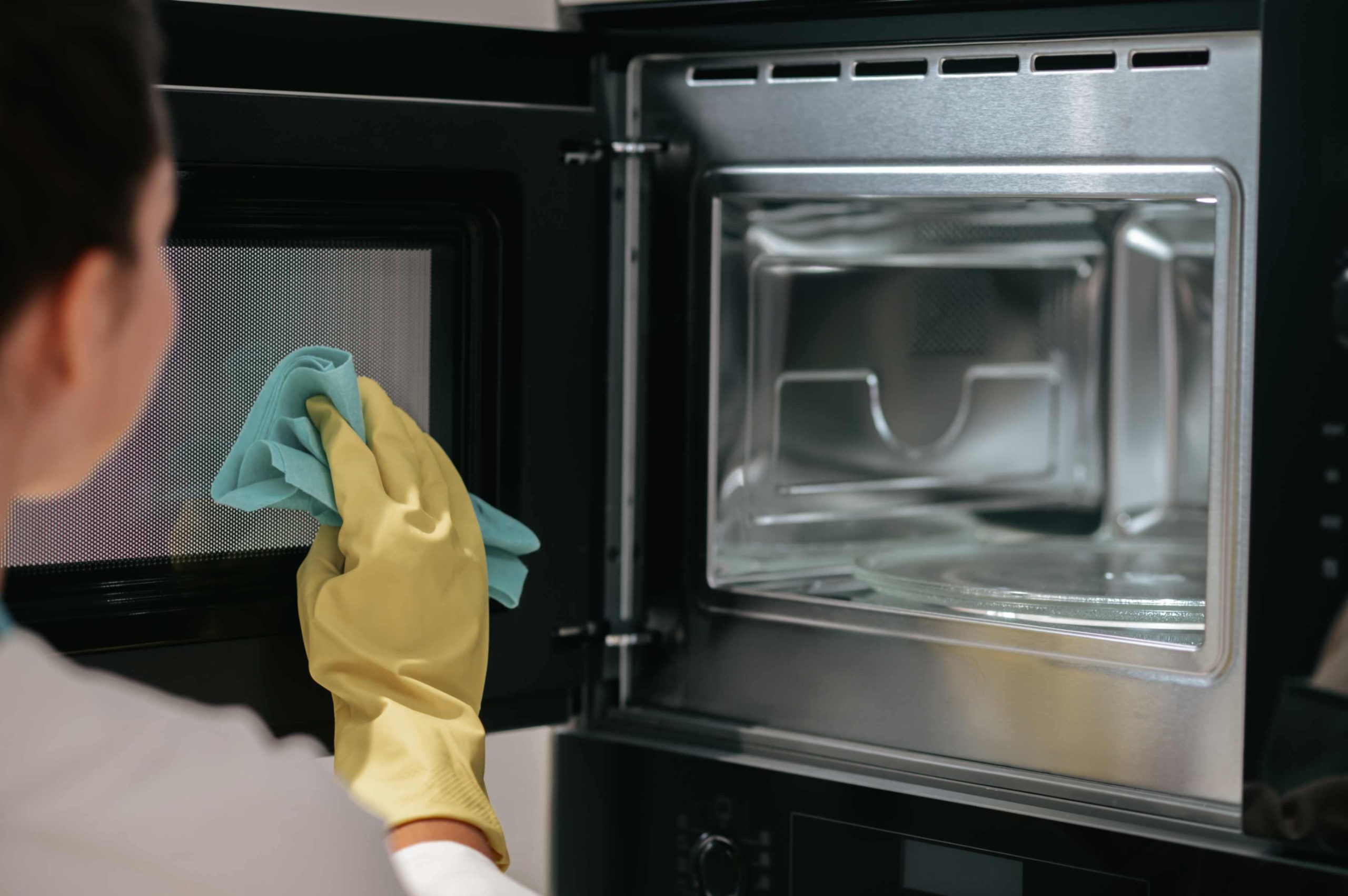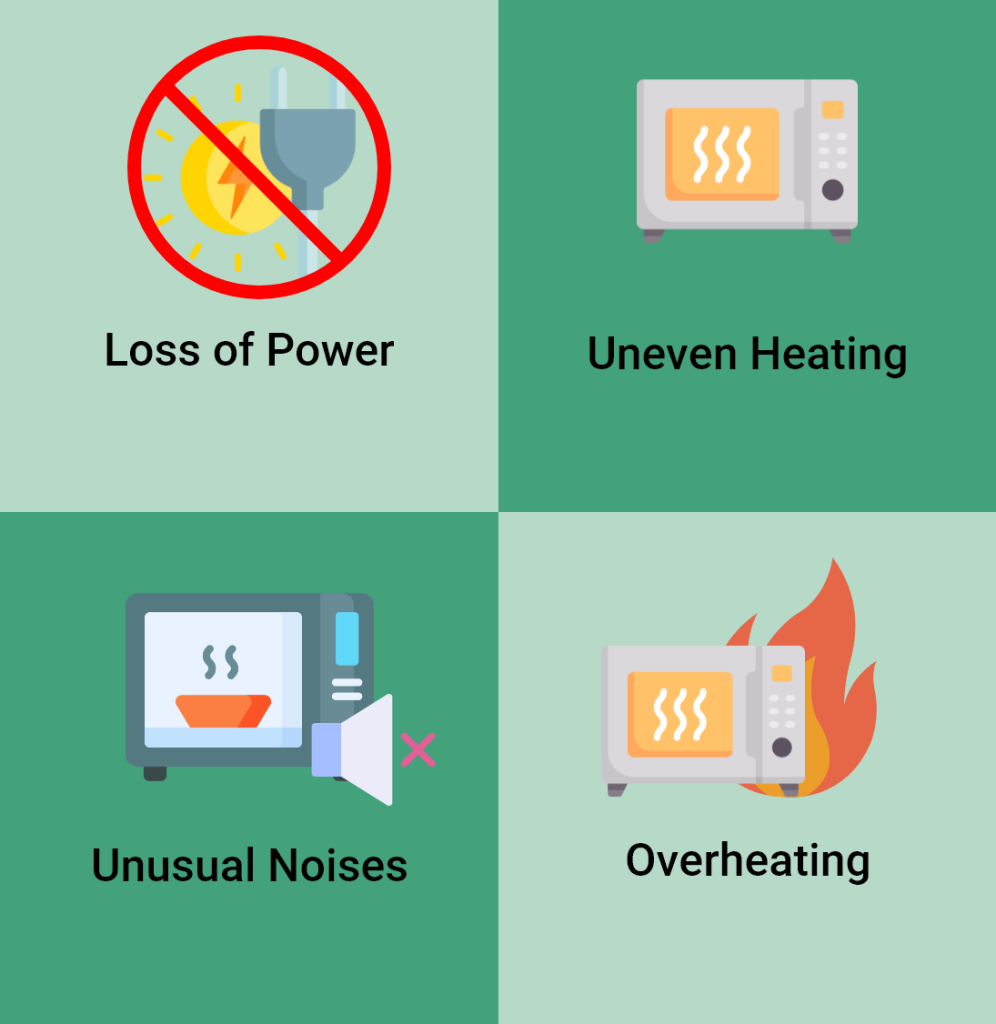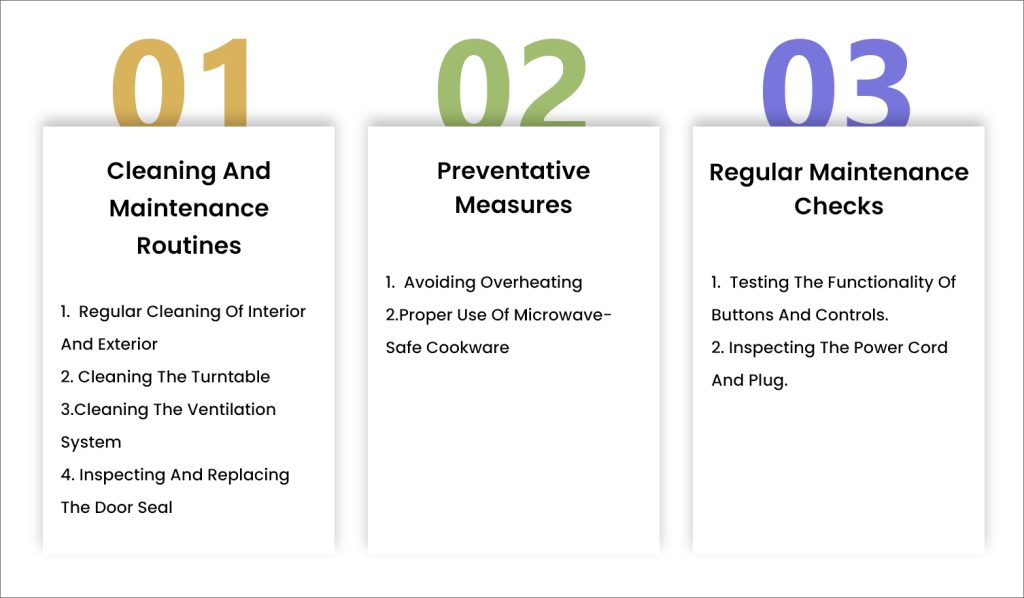 Last updated: August 19th, 2024
Last updated: August 19th, 2024
Microwave Guide 101: Troubleshooting Common Problems & Essential Maintenance Tips

In modern kitchens, microwaves have become a cornerstone of convenience, revolutionizing how we cook and reheat food. However, microwaves are not immune to occasional glitches and performance issues like any appliance.
In this comprehensive guide, we’ll examine common problems with microwaves and provide essential maintenance tips to keep your appliance in top condition.
Common Microwave Problems
Understanding the common problems that can arise with microwaves and how to address them is essential for maintaining their functionality and ensuring smooth meal preparation.

Here, we’ll explore some of the most frequent microwave problems encountered by users, along with practical troubleshooting tips to help you resolve them effectively.
1. Loss of Power
Experiencing a loss of power in your microwave can be frustrating, especially when cooking or reheating food. Let’s explore some common causes behind this issue and practical troubleshooting tips to get your microwave back up and running.
Causes
- Tripped Circuit Breaker: A tripped circuit breaker in your home’s electrical panel may cause the microwave to lose power. This can occur due to overloading the circuit or a short circuit.
- Faulty Power Outlet: A faulty power outlet or loose connection where the microwave is plugged in can prevent power from reaching the appliance.
- Internal Component Failure: Issues with internal components such as the power cord, door switch, or control board can also cause the microwave to lose power.
Troubleshooting Tips
- Check the Circuit Breaker: Check the circuit breaker in your home’s electrical panel. If it has tripped, reset it by switching it back to the “on” position. If it trips again immediately, it may indicate an underlying electrical issue that requires further investigation by a qualified electrician.
- Test the Power Outlet: Plug another appliance or device into the same power outlet to determine if it’s functioning correctly. The issue may be with the microwave itself if the other device works. However, if the outlet is faulty, you may need to repair or replace it.
- Inspect the Power Cord: Examine the microwave’s power cord for any signs of damage, such as fraying, cuts, or exposed wires. If you notice any damage, unplug the microwave immediately and replace the power cord with a new one of the same specifications.
- Check the Fuse: If your microwave has a fuse, such as a ceramic fuse near the power cord, inspect it for any signs of damage or discoloration. If the fuse appears blown, replace it with a new one of the same type and rating.
2. Uneven Heating
Uneven heating in your microwave can lead to inconsistent cooking results and can be a frustrating problem to deal with. Let’s identify some common causes of uneven heating and explore troubleshooting tips to ensure your food cooks evenly every time.
Causes
- Uneven Microwave Distribution: Variations in microwave distribution within the appliance can lead to uneven heating. Certain areas may receive more microwaves than others, resulting in uneven cooking.
- Turntable Issues: If your microwave has a turntable for even cooking, problems with its rotation or alignment can cause some areas of the food to receive more microwaves than others, leading to uneven heating.
- Food Placement: Improper food placement within the microwave can also contribute to uneven heating. Placing food too close to the microwave’s walls or in concentrated areas can result in uneven cooking.
Troubleshooting Tips
- Rotate and Rearrange Food: To promote even heating, rotate and rearrange the food midway through the cooking process. This allows different parts of the food to be exposed to the microwave’s energy, ensuring more uniform cooking.
- Avoid Overcrowding: Avoid overcrowding the microwave with too much food at once. Leaving space between items allows for better airflow and ensures more even heating.
- Use a Turntable: If your microwave has a turntable, ensure it is properly seated and rotates freely. Clean the turntable and its support mechanism regularly to remove any debris or obstructions that may hinder rotation.
3. Unusual Noises
Unusual noises from your microwave can be concerning and may indicate underlying issues with internal components. Let’s examine the potential causes of these noises and practical troubleshooting steps to address the problem.
Causes
- Faulty Magnetron: The magnetron generates microwaves to cook food. It may produce unusual buzzing or humming sounds during operation if worn or damaged.
- Damaged Turntable Motor: If your microwave has a turntable for even cooking, a malfunctioning turntable motor can cause grinding or rattling noises as it struggles to rotate the turntable.
- Worn or Misaligned Fan Blades: Over time, the cooling fan inside the microwave may develop worn or misaligned blades, leading to unusual whirring or scraping noises as it operates.
- Loose or Broken Internal Components: Loose screws, broken mounts, or damaged internal components can create rattling, clanking, or banging noises as the microwave operates.
Troubleshooting Tips
- Check the Magnetron: If you suspect an issue with the magnetron, such as excessive noise or no heating, a qualified technician may need to replace it.
- Examine the Cooling Fan: Listen for scraping noises from the back or sides of the microwave, indicating problems with the cooling fan. Carefully remove debris or obstructions from the fan blades and ensure they rotate freely.
- Inspect Internal Components: Check for loose screws, broken mounts, or damaged internal components that may be causing the noise.
- Test with Different Settings: Experiment with different microwave settings, such as power levels and cooking times, to determine if the unusual noises occur consistently or only under specific conditions.
- Contact a Professional Technician: If you can’t identify or resolve the issue on your own, it’s best to contact a qualified technician for further diagnosis and repair.
4. Overheating
An overheating microwave not only affects cooking performance but can also pose safety risks. Let’s identify common causes of overheating and explore troubleshooting tips to ensure your microwave operates safely and efficiently.
Causes
- Cooking Time and Power Levels: Extended cooking times or high power settings can cause the microwave to overheat, especially if the food is dense or requires a longer cooking duration.
- Improper Cookware Usage: Using cookware that is not microwave-safe or contains metal elements can lead to overheating. Metal objects reflect microwaves, causing them to bounce back and potentially damage the appliance.
- Malfunctioning Thermostat: A malfunctioning thermostat can fail to regulate the microwave’s temperature properly, leading to overheating.
Troubleshooting Tips
- Adjust Cooking Time and Power Levels: To prevent overheating, follow the manufacturer’s recommended cooking times and power settings for different types of food.
- Use Microwave-Safe Cookware: Avoid containers with metal elements or foil linings, as they can reflect microwaves and cause overheating. Opt for glass, ceramic, or microwave-safe plastic containers instead.
- Inspect and Clean the Microwave: Check the interior of the microwave for any food spills, debris, or grease buildup that could obstruct airflow and lead to overheating.
- Allow Proper Ventilation: Adequate ventilation is essential for dissipating heat and preventing overheating. Position the microwave in a well-ventilated area with sufficient clearance around all sides.
- Monitor Operation: While the microwave is in use, pay attention to any unusual smells, sounds, or excessive heat buildup. If you notice any signs of overheating, such as smoke or burning odors, immediately stop the microwave and allow it to cool down before investigating further.
Homeowners’ Guide to Microwave Longevity: Essential Maintenance Tips
Your microwave is a versatile appliance that plays a crucial role in your kitchen, providing quick and convenient cooking solutions. Proper maintenance is essential to ensure it continues to serve you well for years to come.

Explore essential maintenance tips explicitly tailored for homeowners to help prolong the lifespan of their microwaves.
1. Cleaning and Maintenance Routines
Regular Cleaning of Interior and Exterior
- Wipe the interior surfaces with a damp cloth and mild detergent to remove food spills and stains.
- Clean the exterior surfaces, including the door and control panel, to remove fingerprints and grease buildup.
Cleaning the Turntable
- Remove the turntable, wash it in warm, soapy water, or place it in the dishwasher for easy cleaning.
- Wipe down the turntable support and roller ring to ensure smooth rotation.
Cleaning the Ventilation System
- Use a soft brush or vacuum cleaner attachment to remove dust and debris from the ventilation grilles and vents.
- Ensure that the ventilation openings are not blocked to prevent overheating.
Inspecting and Replacing the Door Seal
- Regularly inspect the door seal for any wear or damage, such as cracks or tears.
- Replace the door seal if necessary to maintain a tight seal and prevent heat loss during cooking.
2. Preventative Measures
Avoiding Overheating
- Follow the manufacturer’s guidelines for cooking times and power levels to prevent overheating.
- Avoid running the microwave empty, as this can cause damage to the magnetron.
Proper Use of Microwave-Safe Cookware
- Use microwave-safe containers and utensils to prevent damage to the microwave and ensure safe cooking.
- Avoid using metal or foil containers, which can cause arcing and damage to the microwave.
3. Regular Maintenance Checks
Testing the Functionality of Buttons and Controls
- Periodically test the functionality of the buttons and controls to ensure they are responding correctly.
- If any buttons are not working or responding intermittently, consider contacting a professional for repairs.
Inspecting the Power Cord and Plug
- Check the power cord and plug for any signs of damage, such as fraying or exposed wires.
- Ensure the plug is securely inserted into the outlet to prevent electrical issues.
By following these maintenance tips and practices, homeowners can prolong the lifespan of their microwaves and ensure they continue to operate efficiently for years to come.
When Should You Call A Professional For Maintenance?
By recognizing the limitations of DIY maintenance and knowing when to call a professional, homeowners can ensure the safe and efficient operation of their microwaves while minimizing the risk of further damage or injury.
DIY-Friendly Tasks
- Routine Cleaning: Homeowners easily handle tasks such as wiping down the microwave’s interior and exterior surfaces, cleaning the turntable, and removing food spills.
- Checking Door Seal: Inspecting the door seal for wear and tear and replacing it if necessary can usually be done without professional assistance.
- Testing Functionality: Basic tests to check the functionality of buttons and controls can be performed by homeowners to ensure they are responding correctly.
Consider Calling A Professional
- Electrical Issues: If you notice any issues with the microwave’s power cord, plug, or electrical components, it’s best to call a professional electrician or appliance repair technician for assistance.
- Complex Repairs: For more complex repairs involving internal components such as the magnetron or control board, it’s advisable to seek the expertise of a qualified technician.
- Safety Concerns: If you encounter any safety concerns while attempting maintenance tasks, such as exposed wires or unusual odors, you must stop immediately and contact a professional for help.
How Does A Home Warranty Protect Your Microwave?
A home warranty can offer valuable protection for your built-in microwave oven, mitigating the financial burden of unexpected breakdowns. Here’s a detailed breakdown of how a home warranty safeguards your appliance and the top companies offering coverage:
Coverage for Appliance Malfunction
- Home warranty plans typically cover breakdowns of built-in microwaves due to normal wear and tear.
- Coverage includes malfunctions caused by faulty components like the magnetron or door switch.
- Mechanical failures such as a malfunctioning control panel, faulty door latch, or heating element issues are covered.
- Instead of paying out of pocket, a home warranty allows for payment of a relatively low annual premium or service fee for covered repairs.
Exclusions to Consider
- Home warranty coverage excludes breakdowns resulting from misuse, improper maintenance, or accidental damage.
- Misuse examples include placing metal objects within the microwave or exceeding the recommended weight limits.
- Improper maintenance could involve neglecting regular cleaning or failing to follow manufacturer guidelines.
- Accidental damage encompasses spills impacting functionality, dropping the appliance, or cosmetic blemishes like dents or scratches.
Top Home Warranty Companies Covering Microwave Repairs
$100 OFF and Free Roof Coverage
Premium
$54.99 - $89.99
Deductible
$75.00 - $125.00
Coverage Limit
$4K - $5K
Why We Picked It
AHS offers microwave repairs under its ShieldGold and ShieldPlatinum plans. These plans do not cover countertop models.
$200 OFF and 2 Months Free + Free Roof Coverage
Premium
$54.99 - $69.99
Deductible
$85.00 - $150.00
Coverage Limit
$2K/Item
Why We Picked It
LHG covers microwave repairs under its Appliance Guard and Total Home Guard plans.
$150 OFF and 2 Months Free + Free Roof Coverage
Premium
$54.99 - $64.99
Deductible
$60.00 - $125.00
Coverage Limit
$3K/Item
Why We Picked It
Microwave repairs are included in Select Home Warranty’s Bronze Care and Platinum Care plans.
Conclusion
In conclusion, maintaining your microwave is crucial for its longevity and optimal performance in your kitchen. By understanding common problems, implementing essential maintenance tips, and knowing when to seek professional assistance, homeowners can extend their lifespan and minimize the need for costly repairs.
Regular cleaning routines, proper use of microwave-safe cookware, and periodic maintenance checks can help prevent issues and extend the lifespan of your appliance. Additionally, recognizing the limitations of DIY maintenance and knowing when to call a professional can prevent further damage and ensure safety.
By combining regular maintenance efforts with the added security of a home warranty, homeowners can enjoy the convenience and reliability of their microwave for years to come.
related articles
 Discover First American Home Warranty Locations and What You Need to Know About Their Cover.
Discover First American Home Warranty Locations and What You Need to Know About Their Cover.
 Reviews of Home Warranty Companies Show You How to Determine If Your Home Is Covered
Reviews of Home Warranty Companies Show You How to Determine If Your Home Is Covered












